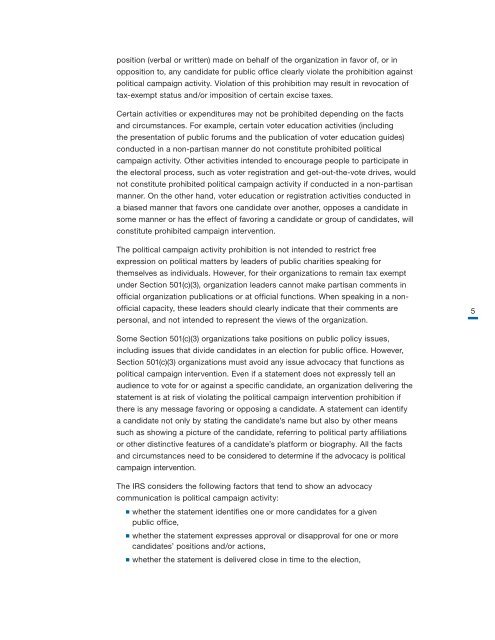The Nonprofit Incubator
The Nonprofit Incubator
The Nonprofit Incubator
You also want an ePaper? Increase the reach of your titles
YUMPU automatically turns print PDFs into web optimized ePapers that Google loves.
position (verbal or written) made on behalf of the organization in favor of, or in<br />
opposition to, any candidate for public office clearly violate the prohibition against<br />
political campaign activity. Violation of this prohibition may result in revocation of<br />
tax-exempt status and/or imposition of certain excise taxes.<br />
Certain activities or expenditures may not be prohibited depending on the facts<br />
and circumstances. For example, certain voter education activities (including<br />
the presentation of public forums and the publication of voter education guides)<br />
conducted in a non-partisan manner do not constitute prohibited political<br />
campaign activity. Other activities intended to encourage people to participate in<br />
the electoral process, such as voter registration and get-out-the-vote drives, would<br />
not constitute prohibited political campaign activity if conducted in a non-partisan<br />
manner. On the other hand, voter education or registration activities conducted in<br />
a biased manner that favors one candidate over another, opposes a candidate in<br />
some manner or has the effect of favoring a candidate or group of candidates, will<br />
constitute prohibited campaign intervention.<br />
<strong>The</strong> political campaign activity prohibition is not intended to restrict free<br />
expression on political matters by leaders of public charities speaking for<br />
themselves as individuals. However, for their organizations to remain tax exempt<br />
under Section 501(c)(3), organization leaders cannot make partisan comments in<br />
official organization publications or at official functions. When speaking in a nonofficial<br />
capacity, these leaders should clearly indicate that their comments are<br />
personal, and not intended to represent the views of the organization.<br />
5<br />
Some Section 501(c)(3) organizations take positions on public policy issues,<br />
including issues that divide candidates in an election for public office. However,<br />
Section 501(c)(3) organizations must avoid any issue advocacy that functions as<br />
political campaign intervention. Even if a statement does not expressly tell an<br />
audience to vote for or against a specific candidate, an organization delivering the<br />
statement is at risk of violating the political campaign intervention prohibition if<br />
there is any message favoring or opposing a candidate. A statement can identify<br />
a candidate not only by stating the candidate’s name but also by other means<br />
such as showing a picture of the candidate, referring to political party affiliations<br />
or other distinctive features of a candidate’s platform or biography. All the facts<br />
and circumstances need to be considered to determine if the advocacy is political<br />
campaign intervention.<br />
<strong>The</strong> IRS considers the following factors that tend to show an advocacy<br />
communication is political campaign activity:<br />
■■ whether the statement identifies one or more candidates for a given<br />
public office,<br />
■■ whether the statement expresses approval or disapproval for one or more<br />
candidates’ positions and/or actions,<br />
■■ whether the statement is delivered close in time to the election,

















